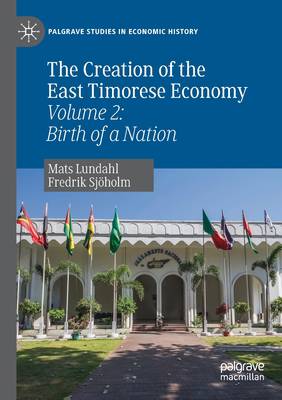
Je cadeautjes zeker op tijd in huis hebben voor de feestdagen? Kom langs in onze winkels en vind het perfecte geschenk!
- Afhalen na 1 uur in een winkel met voorraad
- Gratis thuislevering in België vanaf € 30
- Ruim aanbod met 7 miljoen producten
Je cadeautjes zeker op tijd in huis hebben voor de feestdagen? Kom langs in onze winkels en vind het perfecte geschenk!
- Afhalen na 1 uur in een winkel met voorraad
- Gratis thuislevering in België vanaf € 30
- Ruim aanbod met 7 miljoen producten
Zoeken
€ 83,95
+ 167 punten
Uitvoering
Omschrijving
Very little has been written on the economy of East Timor since the country's independence in 2002, and no comprehensive account exists of the economic history of the country. The former cannot be properly understood without a knowledge of the historical process that created the present-day situation. This research monograph is the first book to combine a historical analysis of the creation and development of the economy of East Timor from the earliest times to the present, and an analysis of the main contemporary problems facing the East Timorese economy.
Volume II offers a detailed analysis of the economy of East Timor, of politics, fiscal policy and social progress. It pays particular attention to structural problems: employment generation and the lack of a modern sector, the modernization of agriculture and the management of the oil deposits in the Timor Sea. The first volume, available separately, considers East Timor from a chronological perspective, as a Portuguese colony, and a country occupied by Indonesia up to national independence in 2002.
This book will appeal to economists, political scientists and social scientists in general as well as practitioners, since it focuses on down-to-earth problems that need to be solved for the economy to develop. The book can also be read by students both at the undergraduate and graduate levels and could be used for case studies in development.
Volume II offers a detailed analysis of the economy of East Timor, of politics, fiscal policy and social progress. It pays particular attention to structural problems: employment generation and the lack of a modern sector, the modernization of agriculture and the management of the oil deposits in the Timor Sea. The first volume, available separately, considers East Timor from a chronological perspective, as a Portuguese colony, and a country occupied by Indonesia up to national independence in 2002.
This book will appeal to economists, political scientists and social scientists in general as well as practitioners, since it focuses on down-to-earth problems that need to be solved for the economy to develop. The book can also be read by students both at the undergraduate and graduate levels and could be used for case studies in development.
Specificaties
Betrokkenen
- Auteur(s):
- Uitgeverij:
Inhoud
- Aantal bladzijden:
- 400
- Taal:
- Engels
- Reeks:
Eigenschappen
- Productcode (EAN):
- 9783030220532
- Verschijningsdatum:
- 26/08/2021
- Uitvoering:
- Paperback
- Formaat:
- Trade paperback (VS)
- Afmetingen:
- 148 mm x 210 mm
- Gewicht:
- 494 g

Alleen bij Standaard Boekhandel
+ 167 punten op je klantenkaart van Standaard Boekhandel
Beoordelingen
We publiceren alleen reviews die voldoen aan de voorwaarden voor reviews. Bekijk onze voorwaarden voor reviews.









